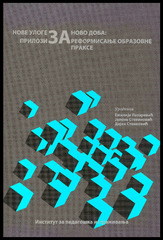Приказ основних података о документу
Учење засновано на искуству: изазов за савремену школу
Experience-based learning: a challenge for modern school
| dc.contributor | Лазаревић, Емилија | |
| dc.contributor | Стевановић, Јелена | |
| dc.contributor | Станковић, Дејан | |
| dc.creator | Лалић-Вучетић, Наташа | |
| dc.creator | Гундоган, Драгана | |
| dc.date.accessioned | 2022-03-18T12:41:47Z | |
| dc.date.available | 2022-03-18T12:41:47Z | |
| dc.date.issued | 2015 | |
| dc.identifier.isbn | 978-86-7447-125-8 | |
| dc.identifier.uri | http://ipir.ipisr.org.rs/handle/123456789/776 | |
| dc.description.abstract | Contemporary pedagogical and didactic tendencies point out complexity, variability and dynamics of teaching situations and methodological approaches, as well as diversity of roles of the basic actors in educational process. In this context the ideas about different approaches to learning, teaching and learning strategies oriented, primarily, towards the active role of the participants in teaching, autonomy and responsibility, initiative and cooperation, self-reflection have been increasingly promoted. The presence of these ideas is found in pragmatism and study of John Dewey who also represents the foundation of a model of experience-based learning (EBL). In this paper the concept of learning through personal experience was analyzed and critically examined, which is, at the same time, a review of the essential characteristics of traditional school. The aim was to establish the values and advantages of a model of experiencebased learning which contributes to creating a different atmosphere both inside and outside the classroom. The question is how students’ initiative, curiosity and independence can be encouraged and what are new or different roles and skills of teachers and students. The results of the analysis of the basic starting a certain degree of flexibility in the method of his or her work and activities that he or she applies, and to be open for innovations and different students’ experiences, taking into account students’ interests and knowledge. When it comes to a student, this learning model, unlike the traditional school, changes the focus to gaining new experiences, the possibility of constructing and reconstructing experiences, overcoming the challenges and personal boundaries, encouraging the perspective of self-discovery. Therefore, by promoting these ideas and principles in teaching it is possible to establish social relations and the environment which emphasizes the perspective of personal experience, personal and intrinsic motivation, self-assessment, responsibility, cooperation, collaboration, exchange of thoughts and feelings, which is also a part of the teacher’s educational work. | sr |
| dc.language.iso | sr | sr |
| dc.publisher | Београд : Институт за педагошка истраживања | sr |
| dc.relation | info:eu-repo/grantAgreement/MESTD/Integrated and Interdisciplinary Research (IIR or III)/47008/RS// | sr |
| dc.rights | openAccess | sr |
| dc.rights.uri | https://creativecommons.org/licenses/by/4.0/ | |
| dc.source | Нове улоге за ново доба : Прилози за редефинисање образовне праксе | sr |
| dc.subject | experience-based learning | sr |
| dc.subject | motivation | sr |
| dc.subject | school | sr |
| dc.subject | teacher | sr |
| dc.subject | student | sr |
| dc.title | Учење засновано на искуству: изазов за савремену школу | sr |
| dc.title | Experience-based learning: a challenge for modern school | sr |
| dc.type | bookPart | sr |
| dc.rights.license | BY | sr |
| dc.citation.epage | 112 | |
| dc.citation.spage | 93 | |
| dc.description.other | Назив збирке: Библиотека "Педагошка теорија и пракса” 41 | sr |
| dc.identifier.fulltext | http://ipir.ipisr.org.rs/bitstream/id/2359/Ucenje_zasnovano_na_iskustvu_2015.pdf | |
| dc.identifier.rcub | https://hdl.handle.net/21.15107/rcub_ipir_776 | |
| dc.type.version | publishedVersion | sr |

